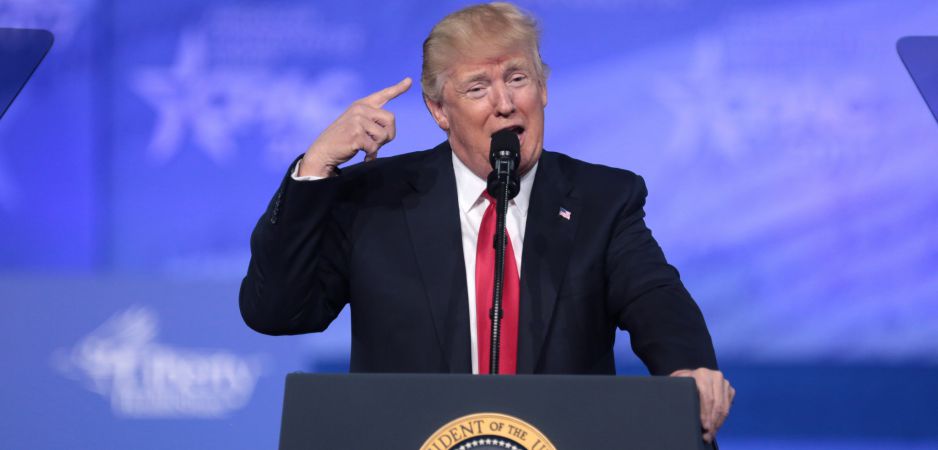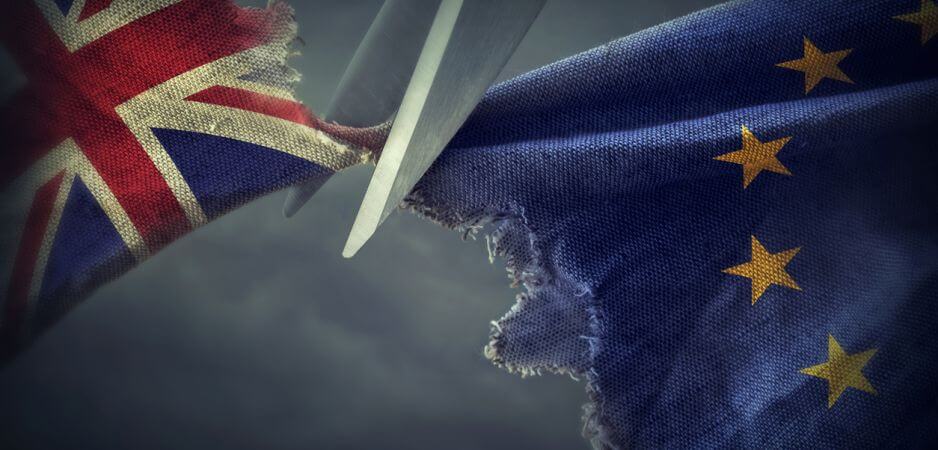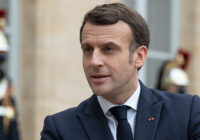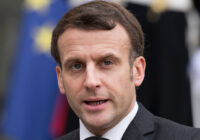The French vote for outsiders because Charles de Gaulle’s Fifth Republic is failing to tackle challenges facing the country.
This week, a 600-year-old oak tree that George Washington loved was cut down as the White House proposed tax reform. The Economist, no left-leaning lily livered publication, found the claim that tax cuts would be compensated by increased economic growth as “fanciful” and worried that the so-called reform might principally benefit the rich. It also warned of the danger that it might be paid for with more borrowing.
Perhaps tariffs might be handy in filling the tax shortfall. The US has slapped duties of up to 24% on Canadian softwood lumber. So far, Uncle Sam and Lumberjack Country have been the best of neighbors. Now, the relationship is not so rosy. Apparently, Canada fired the first shot across the bow with its new milk policy that violates the North Atlantic Free Trade Agreement (NAFTA) and hurts dairy farmers in states like Wisconsin and Minnesota. The US has responded by penalizing Canada for subsidizing its timber exports. The spat between the US and Canada over trade is a clear sign that protectionism is entering the global zeitgeist.
Elsewhere, Turkey’s government purged more than 9,000 policemen and thousands of Venezuelans marched to demand the release of political prisoners. In South Africa, the Supreme Court shot down its government’s nuclear deal with Russia. This is a big blow to the embattled South African president and a bigger setback to Russia. Even as the court checked the president in South Africa, a Zambian court upheld charges of treason against the opposition leader for allegedly blocking the president’s motorcade.
Despite the many events this week, all eyes were on France. For some decades now, intractable problems have upended many presidents and caused what The Independent calls “the French malady.”
UNCHARTERED WATERS
In 2007, Paulo Montfort remarked to this author that la grande nation is deeply conservative and incapable of reform. Hence, “revolution is the only way the French do change.” This week, the land that Jean-Jacques Rousseau and Napoleon Bonaparte made their home booted out candidates from traditional political parties in the first round of the presidential election. Instead, voters plumped for two outsiders to square off for the fabled Élysée Palace. Heads may not have rolled yet, but this might lead to yet another la révolution française.
Unlike the United Kingdom, which prides its parliamentary democracy for its evolutionary instead of revolutionary tendencies, France is on to its Fifth Republic. In between, dictators, democrats, generals, kings and emperors have had their time in the sun amidst war, peace, chaos, order, poverty and prosperity.
Why is this land of Louis XIV and Voltaire quite so tumultuous?
In Montfort’s deterministic view of France, les français are rather strongly attached to their ideas, principles and way of life. They cannot quite stomach reform. Besides, landlocked Paris is the beating heart of this highly centralized country. Interest groups in the City of Light tend to be rather less nimble than those in sea-facing London. Since Oliver Cromwell beheaded Charles I, the masters of the universe at London have proved to be rather adept at reforms that bring in change while salvaging the status quo.
In contrast, the masters of la grande nation have repeatedly failed to reform in a timely fashion. Consequently, angst and anxiety tend to rise. Eventually, these simmering tensions cause the gasket to blow off the pressure cooker. This has been the recurring French story since 1789. The French Revolution might be celebrated every July 14 as Bastille Day, but it is hard to forget that many hundreds were carted off in tumbrils to the guillotine. Therefore, dreams of liberté, égalité, fraternité remain inextricably intertwined with the nightmare of the Reign of Terror.
Since 1958, Charles de Gaulle’s Fifth Republic has endured. It granted independence to Algeria, transformed itself into a nuclear power and forged the creation of the European Union. This nation of a little over 66 million is still the world’s fifth largest economy after the UK’s post-Brexit slip-up. Yet the country has revolted spectacularly against its political elite. On May 7, Marine Le Pen and Emmanuel Macron will run-off for the French presidency, after winning 21.4% and 23.9% of the votes cast respectively.
Le Pen is a far-right leader who has succeeded to her father’s throne. She has made Front National (FN) far more palatable to mainstream French society than her rabidly anti-Semitic father. Instead of Jews, she targets undocumented workers, or illegal immigrants as Donald Trump would say. That they happen to be mainly Arab and Muslim is a pure coincidence.
Le Pen has learnt the lessons of her father’s abject defeat in 2002 rather well. Jean-Marie Le Pen quibbled about the Holocaust, took extreme positions and used rhetoric that terrified many in France. As a result, Jacques Chirac crushed Le Pen’s father in the 2002 runoff. Consequently, Le Pen and her lieutenants have worked hard to “normalize” their party. In the words of the BBC, they are “practiced, presentable, professional” on television. The FN has fed off the public resentment against le déclassement, the loss of economic and social status. As elites have fatted themselves on foie gras, working- and even middle-class French have suffered. They now rally behind Le Pen.
Opposing Le Pen is an alluring youthful figure. Macron is a 39-year-old former investment banker who graduated from École Nationale d’Administration (ENA) served in President François Hollande’s cabinet and then jumped ship to start his own party. In classic Gallic fashion, this rather good looking high flier is married to his former high school teacher who is now 64.
Macron, the son of doctors and a thoroughbred bourgeois gentleman, is a centrist. While Le Pen wants to quit the European Union, Macron wants to lead it. He has promised to take the lead in defending the EU’s democratic values if elected, promising to push for EU sanctions against Poland if it continues to weaken the judiciary, refuse to take in refugees and dilute rule of law.
On April 26, Le Pen and Macron memorably squared off at a Whirlpool tumble dryer factory. The brouhaha was about Whirlpool’s plans to move its tumble-dryer production to Poland. Hence, the company will close its factory in Amiens, the northern French city with the largest Gothic cathedral in the country. This puts more than 500 jobs at risk in this Hauts de France region, a stronghold of Le Pen.
In the words of France 24, the FN has built its base in this region by “stumping for a strong welfare state in old Communist bastions well past their industrial heyday.” Hence, Le Pen arrived all smiles at the Whirlpool factory unannounced to pose for selfies with striking workers. Macron, who was born and raised in Amiens, had no option but to follow suit. To his credit, he engaged workers in “a long, lively discussion” and told them what he could and would and could not and would not do. Macron said that banning dividends and prohibiting a company from closing a factory was not possible and might be counterproductive “because there is a freedom of enterprise and free property in our democracy.”
FRANCE IN CRISIS
France was at full employment only in 1974-75. Since 1980, the country has suffered from chronic high unemployment. Low economic growth and rigid labor laws have made it very difficult for people to switch jobs. For many decades, France has been a country where people have wanted to immigrate. Now, increasing numbers are emigrating for better opportunities abroad. They tend to be young, educated and from the upper middle classes.
 Despite its relative prosperity, France is not rife with economic opportunities. The state dominates the economy and énarques, graduates of ENA, allocate resources. In this dirigiste state, énarques control the commanding heights of the economy and red tape asphyxiates entrepreneurs. In 2015, government spending as a percentage of GDP was higher in France than Greece. As per the Organization for Economic Co-operation and Development (OECD), it was a whopping 57% of GDP that made it the highest in Europe.
Despite its relative prosperity, France is not rife with economic opportunities. The state dominates the economy and énarques, graduates of ENA, allocate resources. In this dirigiste state, énarques control the commanding heights of the economy and red tape asphyxiates entrepreneurs. In 2015, government spending as a percentage of GDP was higher in France than Greece. As per the Organization for Economic Co-operation and Development (OECD), it was a whopping 57% of GDP that made it the highest in Europe.
Even when leaders of the right have been in power, France has followed economic policies that many would term socialist. In fact, the left has enjoyed a half-century of cultural hegemony. This has given la grande nation a cradle to grave welfare state, but it has also clogged up the economic arteries. In France in Crisis, Canadian historian Timothy B. Smith chronicled how the economic and social model of this great European nation was coming apart at the seams.
Smith writes that France’s per capita expenditure on social services was twice that of Canada’s. Yet social mobility was “considerably higher in Canada.” France spends almost as much as Sweden on things “social,” but it has twice the unemployment and three to four times the poverty. Alarming inequalities lie at the heart of the French welfare state. The French may have lovely safety nets, but they have ugly glass ceilings as well. In Smith’s words, the French like “solidarity in sickness but not in wealth.”
Therefore, it is unsurprising that French elites are incredibly incestuous. Key political and economic positions are monopolized almost entirely by énarques and graduates of other grande écoles, the top French schools. During the period 1987-96, only 5.5% of énarques “hailed from working-class backgrounds.” The figure for Canada’s top schools was 25-30%. It is only fair to say that these elite French schools perpetuate “a tiny caste-like aristocracy of wealth and brains” that would make inbred Brahmins proud.
Naturally, the land of revolutions is not exactly enamored of its énarque elite. The BBC’s terrific analysis of Marine Le Pen captures why the French have been turning to the FN. In the former communist bastion of the far north, the party’s focus on values, education, protection of domestic industry and hatred of global finance resonates with workers who have lost jobs as companies like Samsonite have relocated abroad and metal production has slumped. Many in France blame la gauche caviar, the caviar loving left, of selling them down the river.
In the far south, pieds-noirs, Europeans born in French Algeria, have long held sway. It is here that Algerians have flocked to throng towns like Bezier, which has a formerly far-left mayor supported by Le Pen’s FN. He says, “The world has changed.” Mayor Robert Menard grew up in La Deveze, a banlieue that is now notorious for drugs, arms trafficking and radical Islam. This pied-noir remembers a time when Algerians arrived in La Deveze to abandon headscarves and embrace the French language.
Now, Menard finds the North Africans, Turks and French Roma (gypsies) living in separation. This ghettoization and even Balkanization has been going on in France for a while. In 2005, riots broke out in 274 towns for three weeks. Smoldering disaffection among minorities erupted in prolonged violence when two young boys died hiding from the police. Angelique Chrisafis observes “nothing’s changed” 10 years on.
The November 14, 2015, edition of The World This Week posited that persistent “unemployment, crime, discrimination, racism and social exclusion” are leading to angry young men falling prey to the millenarian vision championed by the Islamic State. Consequently, France has suffered terror attacks and provided the highest number of foreign European fighters in Syria.
The radicalization of young Muslim men is causing palpitations in the land of laïcité, a doctrinaire form of secularism that decrees complete isolation between religious and public spheres. Obviously, Islam does not have such a separation and challenges French secularism. After winning its protracted battled with Catholicism, the French state does not know how to deal with devout Muslims.
The August 21, 2016, edition of The World This Week examined how the land of bikinis was making much ado about burkinis. This author argued that French politicians are misguided in thinking that banning burkinis will fight terror and liberate women. Religious injunctions against immodesty or life of the senses are largely silly, but banning them is unwise. More than anyone, the French must realize that seduction is better than coercion. A clash of values inevitably occurs when religious immigrants come to permissive France. Furthering opportunity and optimism might make these immigrants discover la joie de vivre française instead of turning to a supposedly merciful god who keeps accounts of their actions for judgment day.
WHITHER THE REPUBLIC?
With its low growth, rising debt and high unemployment, the fifth largest economy in the world is in crisis. Its welfare state is dysfunctional, social mobility pathetic and minorities restive. The left’s platitudes have lost appeal and the right’s scandals have stripped away its credibility.
The 1958 vintage Fifth Republic is struggling to cope with the multiple crises facing France. The Financial Times rightly points out that the current French constitution gives far too much power to the president. Most modern democracies and the last four French republics were more democratic, transparent and parliamentarian. General Charles de Gaulle was a charismatic wartime leader who tailor-made the presidency for himself.
Consequently, the French president is supposed to have an “almost mystical relationship with the French people, regal in tone but resting on his democratic legitimacy.” Furthermore, the president is expected to “govern wisely and decisively, act with dignity in his public and personal life, embody French ideals and be in tune with the democratic spirit of the age.” Midgets like “Bling Bling” Nicolas Sarkozy and “Flanby” François Hollande found the towering de Gaulle’s boots too big to fill.
Le Pen and Macron will find the presidency harder still. France is deeply polarized and profoundly insecure about the future. The political system, the presidency and the Fifth Republic itself are damaged goods. France needs constitutional, not just economic or political change.
Le Pen is certainly promising radical change. With her gay advisers and support for abortion, the twice divorced Le Pen is not your usual far-right leader. However, she shares one idea with her comrades of the far-right. She believes in the idea of the nation first and foremost. Foreigners and foreign goods will no longer be welcome. Even les anglo-saxons who created the Frankenstein of globalization and free trade have turned their back on it. Trump and Brexit have filled Le Pen’s sails. She has opportunistically appropriated many of the economic ideas of the left, including retaining the retirement age of 60. Furthermore, Le Pen plans to restore power to Paris from Brussels. Frexit is Le Pen’s favored option, which would bring back the franc and kill the EU.
While Le Pen is a known devil, Macron is an unknown one. Until recently, this énarque was a member of la gauche caviar and served the insipid Hollande. This young man with energy, charm, composure, eloquence and good luck has been courageous in his campaign. For instance, he suffered a fall in his popularity ratings when he called the French colonization of Algeria a “crime against humanity.”
Yet Macron does not belong to any party and has no clear program. His En Marche movement is far too young, amorphous and inchoate. It might well disintegrate once the election is over. No one knows what legislation he will propose and how he will push it without much support in parliament. In any case, he does not command much public support and has not even won a quarter of the vote in the first round of the election. Even if Macron wins, there is a real risk that Le Pen might succeed him in Élysée Palace just as Trump replaced Barack Obama in the White House.
The Fifth Republic is a mess and will be dysfunctional whoever wins on May 7. It is high time that France’s Gaullist presidential system turned more parliamentary, transparent and accountable. La grande nation is ripe for another revolution.
*[You can receive “The World This Week” directly in your inbox by subscribing to our mailing list. Simply visit Fair Observer and enter your email address in the space provided. Meanwhile, please find below five of our finest articles for the week.]
Democracy Check: Trump at 100 Days
An assessment of institutional democracy at the onset of the Trump administration.
Since his election to the US presidency on November 8, 2016, there has been much discussion as to whether Donald Trump is a rising authoritarian strongman who will bring the downfall of liberal democracy in the United States. Has this commentary been hyperbolic? While there are legitimate concerns regarding his presidency, are America’s democratic institutions healthy enough to impede the policy agenda of Trump and his far-right administration?
In order to explore these questions and accurately assess the state of America’s structural democracy at the 100-day mark of the Trump administration, this article uses Assessing the Quality of Democracy: A Practical Guide by the International Institute for Democracy and Electoral Assistance as a source for required institutions in liberal democracies. To limit the analysis, the article only considers actions and occurrences since President Trump’s inauguration on January 20, 2017. As such, there is no analysis of… Read more
Political Opportunism Will Make Brexit Worse
Opportunistic nationalists and their shortsighted referenda proposals could usher in the disintegration of the UK.
British Prime Minister Theresa May recently invoked Article 50 of the Lisbon Treaty, which formally notified the European Council of the United Kingdom’s intent to leave the European Union. The forthcoming negotiations offer the first glimpse into what the future relationship will be between the United Kingdom and the soon-to-be 27-member EU. However, Brexit also raises doubts about the political union between the four constituent nations of England, Scotland, Wales and Northern Ireland.
The divisive referendum campaign and its aftermath have reopened old tensions and sowed new divisions between the constituent nations. Driven by opportunism, nationalists in Scotland, Wales and Northern Ireland are proposing independence referenda for their respective regions. These nationalist movements are not monolithic, but they are collectively calling for the dissolution of the UK during one of the most critical junctures in its modern history. If staged, these referenda would… Read more
These Nuclear Breakthroughs Are Endangering the World
How a growing technology gap between the US and its nuclear-armed rivals could lead to the unraveling of arms control agreements — and even nuclear war.
At a time of growing tensions between nuclear powers — Russia and NATO in Europe, and the United States, North Korea and China in Asia — Washington has quietly upgraded its nuclear weapons arsenal to create, according to three leading American scientists, “exactly what one would expect to see, if a nuclear-armed state were planning to have the capacity to fight and win a nuclear war by disarming enemies with a surprise first strike.”
Writing in the Bulletin of Atomic Scientists, Hans Kristensen, director of the Nuclear Information Project of the Federation of American Scientists, Matthew McKinzie of the National Resources Defense Council, and physicist and ballistic missile expert Theodore Postol conclude that “Under the veil of an otherwise-legitimate warhead life-extension program,” the US military has vastly expanded the “killing power” of its warheads such… Read more
An Empowered Fool is At the Helm
 Donald Trump’s disinterest in learning and building a substantive base for decision-making is appalling.
Donald Trump’s disinterest in learning and building a substantive base for decision-making is appalling.
Virtually all US presidents seem to learn very quickly how to use America’s military might to kill, maim and destroy. It doesn’t seem to matter at all what they promised to the never suspecting populace about this critical issue. Get elected, drop bombs.
So, it seems completely natural that Donald Trump would almost immediately gravitate to the “toys” that come with the office. In his scorched earth rise to political stardom, Trump at one time or another promised everything to the American people and nothing to the American people, so he didn’t even have to pause for a fact check on his way to the toy box. Now that Trump has awakened to the notion that children are maimed and killed by “bad guy” bombs, we can only hope he figures out that “good guy” bombs often do the same thing to children… Read more
FIFA Congress: An Israeli-Palestinian Battleground
Soccer teams from Israeli settlements in the West Bank are likely to be the order of the day at the FIFA Congress in May.
The annual FIFA Congress is likely to become the first international forum since Donald Trump took office to debate Israel’s controversial settlement policy. Israeli efforts to prevent FIFA, the world soccer body, from debating and possibly censoring it for allowing teams from Jewish settlements in the Occupied Palestinian Territories to play in Israeli leagues are complicated by the fact that Trump has called on Benjamin Netanyahu to freeze settlement activity.
The US president has expressed unconditional support for Israel and sharply criticized a resolution in December 2016 in the United Nations Security Council that condemned, with acquiescence of the Obama administration, Israeli settlement policy. Trump, who has made achieving Israeli-Palestinian peace one of his foreign policy goals, nevertheless advised Prime Minister Netanyahu on an official visit to Washington earlier this year that settlements… Read more
The views expressed in this article are the author’s own and do not necessarily reflect Fair Observer’s editorial policy.
Photo Credit: Niyazz
Support Fair Observer
We rely on your support for our independence, diversity and quality.
For more than 10 years, Fair Observer has been free, fair and independent. No billionaire owns us, no advertisers control us. We are a reader-supported nonprofit. Unlike many other publications, we keep our content free for readers regardless of where they live or whether they can afford to pay. We have no paywalls and no ads.
In the post-truth era of fake news, echo chambers and filter bubbles, we publish a plurality of perspectives from around the world. Anyone can publish with us, but everyone goes through a rigorous editorial process. So, you get fact-checked, well-reasoned content instead of noise.
We publish 2,500+ voices from 90+ countries. We also conduct education and training programs
on subjects ranging from digital media and journalism to writing and critical thinking. This
doesn’t come cheap. Servers, editors, trainers and web developers cost
money.
Please consider supporting us on a regular basis as a recurring donor or a
sustaining member.
Will you support FO’s journalism?
We rely on your support for our independence, diversity and quality.










